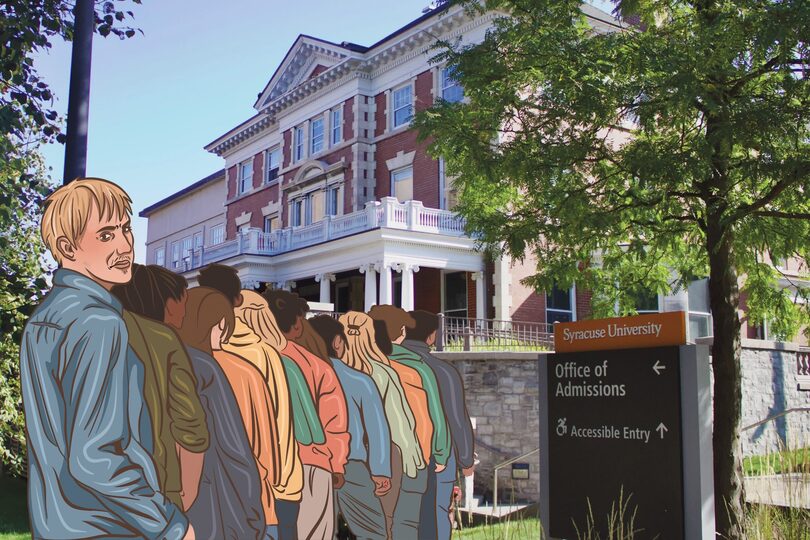‘Slap in the face’: SU’s late merit offers frustrate excluded families

In May, Syracuse University offered up to $200,000 in additional merit aid to students who hadn’t accepted their admissions offer. Parents of incoming freshmen who were not offered that aid said they've been left with a “sour taste” in their mouths. Photo Illustration by Leonardo Eriman, Emma Soto
Get the latest Syracuse news delivered right to your inbox.
Subscribe to our newsletter here.
When Kathleen Z. heard her daughter’s best friend received an additional merit aid offer from Syracuse University, she felt confused, as it was already past May 1 — national college decision day.
Her daughter applied to SU with similar high school stats and accepted her offer in April. While they found it strange, she said they forgot about it. A month later, she saw an article from The New York Times with the headline “Why Did Syracuse Offer $200,000 Deals to Teens Who Had Turned It Down?”
Then, she knew the university was playing an expensive game.
“I thought we had to be in by May 1. I didn’t know there was a game here of ‘Hey, if you don’t, accept, they’re going to throw money at you,’” said Kathleen Z., who requested not to use her full name to protect her daughter’s privacy. “I would have been happy to play that game and get a lot more money than I was given.”
In May, the university offered up to $200,000 each in additional merit aid to students who hadn’t accepted their admissions offer to SU, the Times reported. The offers came via email in the weeks following the decision date, which is widely known as a non-negotiable deadline.
Merit aid is awarded based on a student’s “academic achievement” according to SU’s website. The university bases scholarships on academic credentials, class rank, standardized test performance, leadership and “overall citizenship.”
As the university restructures its major programs across campus, many parents of incoming freshmen are left wondering where the university’s priorities lie, and told The Daily Orange they’re entering the next four years with a “sour taste” in their mouths.
“Syracuse is a great school,” Kathleen Z. said. “We’re excited about her potential here. But playing around with the money side of things, the financial side of things, is not something that sits well with us.”
Chelsea Cheng, whose daughter is a freshman in the School of Architecture, said they initially received a merit offer of $25,000. Because it was her first time sending a child to college, Cheng said she didn’t know how much SU, or other universities, typically awarded in aid.
After she learned SU only offered her friend’s child $10,000, she thought maybe her initial offer from the university was high. Cheng’s daughter fell in love with the school after attending SU’s Pre-College program, so despite receiving a higher aid offer from another school, she supported her daughter’s decision to commit in April.
A few days after May 1st, the same friend told Cheng that her daughter — who didn’t commit to SU — received an additional $50,000 merit award.
“I was pissed. You’re saying that because we like (SU), and we commit early, we’re not giving you money. That’s the big blow,” Cheng said. “It’s totally a slap in the face.”
In a Wednesday statement to The D.O., a university spokesperson said SU “once again” received a record number of applicants.
The spokesperson said SU’s admissions efforts reflect the university’s “long-standing commitment” to student success. The result of this year’s application cycle ended with a “dynamic” incoming class, they said.
“Each admissions cycle brings its own distinct elements and trends, and this year was no exception,” the spokesperson wrote. “As always, we employ a wide range of strategies to enroll exceptionally talented students who demonstrate promise, regardless of their financial means.”
Over the course of several days, Cheng and Kathleen Z. sent multiple emails to SU’s Office of Financial Aid pressing for details about why some families were offered more aid than students who had already committed.
Despite their efforts, neither parent said they received any reply.

Joe Zhao | Senior Staff Designer
“It was upsetting to learn that after appealing, each time we were offered $2,500, which, compared to the $45,000 one could get just by not committing, became a bit of a joke,” Cheng wrote in an email obtained by The D.O.
SU’s silence throughout the situation left them feeling dismissed, the two said. They felt parents deserved an explanation, as many parents already made significant financial and personal commitments to SU.
“It just is a little bit of a sour note on something that should be really great,” Kathleen Z. said.
Cheng echoed that frustration, adding that the lack of communication has only deepened her disappointment.
“I was really looking for their take, what the explanation is, besides just speculation,” Cheng said. “The fact that they didn’t address it after it was publicly found out, that’s also pissing the parents off.”
The university boasted a 7% increase to its financial aid budget in May, totaling $391 million in financial aid, scholarships, grants and other forms of financial assistance. But with SU’s cost of attendance nearing $95,000 per year, Cheng said the small award isn’t enough.
Nima Yadollahpour, an SU alum, said he was frustrated and ashamed to learn that the university was using this tactic.
“Merit aid should reward achievement and make a great education accessible—not serve as a last-minute admissions tactic,” Yadollahpour said in a statement to The D.O. “The top priority should be helping deserving students afford a top-notch education, not spending exorbitant sums on flashy facilities to keep up appearances or compete with other schools.”
Yadollahpour said SU’s actions felt “dishonest” and made him question the integrity of the university’s merit aid process.
“I think many alumni—whether they donate to the school or have children considering Syracuse—may now seriously reconsider their support,” Yadollahpour wrote. “I’ve always been proud to be an alum, but actions like this make it much harder to feel that same pride.”
Elizabeth Morgan, whose son committed to SU in April, said she didn’t care to hear about others’ additional offers, as it wouldn’t change what her family received. Despite being offered grants and student loans, she said the cost of attendance was still high.
Morgan said she and her family feel almost insulted by the university as they “followed the rules” and committed on time, yet it didn’t seem to matter to SU.
“This is my first kid going to college,” Morgan said. “I assumed you don’t commit by May 1, ‘See ya, not interested.’”
Morgan questions if the university used this strategy due to a declining international student population, who typically pay the full cost of attendance.
President Donald Trump’s administration revoked three SU students’ visas in April. Nationwide, the administration has revoked over 6,000 student visas as part of Trump’s promised crackdown on immigration, NBC News reported.
Over the summer, the university’s Center for International Services, which acts as the official liaison with United States immigration offices for international students at SU, lost just over a third of its staff.
“These days, you have to question the international student enrollment,” Morgan said. “How has that changed? Federal government money? Are universities getting spooked about that?”
Tara N., whose son is in the College of Arts and Sciences, received and accepted one of the offers.
The top priority should be helping deserving students afford a top-notch education, not spending exorbitant sums on flashy facilities to keep up appearances or compete with other schoolsNima Yadollahpour, SU alum
Her son initially committed to Colorado State University, but it wasn’t until he received an additional offer just a few days after his graduation that he finally committed to SU.
“The additional award was literally what we needed to go there,” said Tara N., who requested to use her middle name to protect her son’s privacy. “We were like ‘Well, now this is a game changer’ because it’s the same cost, if not slightly cheaper, than the state school.”
Tara N. said she knew how the process worked after experiencing her four children apply to college. She wasn’t surprised SU was using this tactic, she said, but didn’t think it would happen to her family.
The number of applicants to universities across the country rises each year, Forbes reported. By March 1, the number of applications nationwide had increased by 6% from 2024, with students applying to a wider variety of schools.
Students applying to schools across the country, including the University of Miami, Santa Clara University and Seton Hall University, received similar offers after May 1, New York Magazine reported.
While she’s grateful the “life-changing” offer allows her son to attend his “dream school,” Tara N. is scared the negative attention from other families, combined with this being the first year SU has offered late aid, will impact his offer.
She and other parents are also curious to see whether SU uses this tactic for the next application cycle.
“I worry about what’s going to happen next year,” Tara N. said. “Are they going to get more applicants than normal again? And what are they going to do? Because they don’t want to set a precedent, so they’re gonna have to be really careful.”
Cheng said that when her youngest daughter applies to colleges, she won’t be committing to SU.
“We are just going in for our kids, but we’re going in with such a sour taste in our mouths,” she said. “With my younger one, I’m gonna definitely ask her to apply to Syracuse and say do not commit. I’m gonna fight. I don’t know, maybe I’ll get lucky.”






